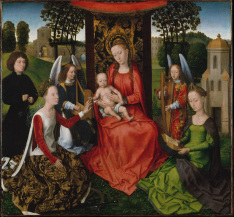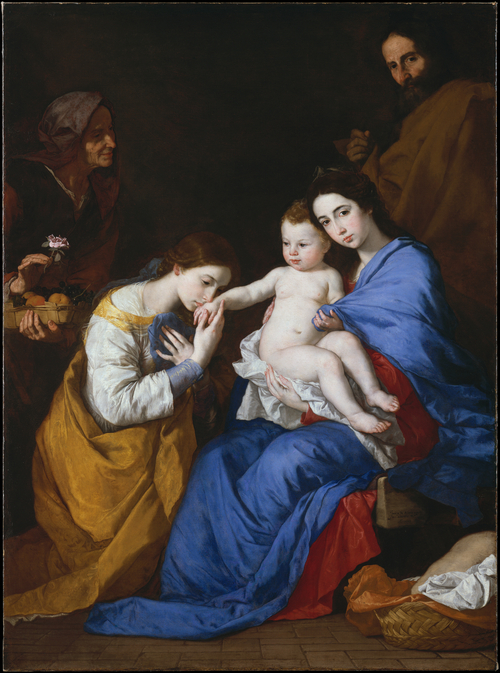\ˈka-th(ə-)rin- ˈhwēl\
A Catherine wheel is a kind of firework that rotates while it burns. Often it’s a rocket or a sparkler angled and mounted on a pin, so that it spins around in a circle as it fires. I don’t know whether many Americans call it by this name: fireworks vendors also call them pinwheels. But “pinwheel” seems like a puny little name compared to Catherine wheel, which carries love and death and torture and mystic visions trailing in its wake.
Here’s the story:
Catherine was the daughter of the pagan king of Alexandria in the 4th century CE. She was brilliant and well-educated, as you might expect from someone who grew up with free run of the greatest library in the world. And when it came time for her to marry, she announced that she wasn’t going to settle for anyone less beautiful, wise, or wealthy than herself. Many suitors presented themselves and were summarily dismissed—until the Virgin Mary appeared to Catherine in a vision and married her to Jesus.
Around this same time the Roman Emperor Maxentius was persecuting Christians (a popular pastime among 4th century Roman emperors). Cathy paid him a visit, hoping that she could talk him out of this. Maxentius, having heard her widely praised as a brilliant and well-educated young woman, decided to put her in her place by arranging for her to debate his top scholars and orators. These fellas, Max told himself, would smack down her pro-Christian arguments and establish once and for all that idol worship was where it was at for all good Romans.
They didn’t stand a chance.
Cathy whupped them. She ran rings around them logically. Adding insult to injury, her arguments were so compelling she converted her opponents to Christianity on the spot. Enraged, Max had his scholars put to death and threw Cathy in prison, figuring that if he couldn’t shut her up with reason he probably could with force.
In prison, though, she turned out to be even more of a rock star. Hundreds of visitors streamed through her cell to meet her and talk with her, and she converted them all. As convert after convert emerged, Max’s fury grew even greater and he had all of them—including his own wife—executed as well.
And still people flocked to her. Desperate to stem the tide, Max tried a different tack: perhaps Cathy would marry him? Seems a perfect plan: he’s an emperor, she’s a princess, and hey! as it happens, he’s available!
Cathy would have none of it. She was already married. (To a baby, but that’s beside the point.)
At which point Max lost it completely and sentenced Cathy to death on the wheel. (This is a horrible mode of execution: the condemned is tied to a wagon wheel and bludgeoned to death, with the executioner breaking as many bones as possible along the way.)
Before researching this post I had always assumed that this was how she died. Saints are often depicted with the instruments of their martyrdom, and Catherine is usually shown with a large wooden wheel with metal spikes attached. Plus it’s super gruesome, and that always is a plus for martyrs.
St. Catherine became a hugely popular saint in the Late Middle Ages. Historians agree that she almost certainly never existed, but that has not stopped people from building shrines, displaying bones said to be hers, and peddling phials of the healing oil said to flow from her miraculously preserved body.
She is honored today as the patron saint of philosophers, preachers, librarians, and scholars. (She is not, however, the patron saint of fireworks—that honor goes to St. Barbara, who is also for some reason the patron saint of mathematicians.)
Our family missed out on 4th of July fireworks this year: the kids and I were fresh off a much-delayed cross-country flight and ended up falling asleep before they even started. But as I lay dozing in bed, hearing the distant whoomps and thumps and howling dogs, it seemed somehow fitting that a story that starts with a girl and a library ends up with fireworks.




 RSS Feed
RSS Feed